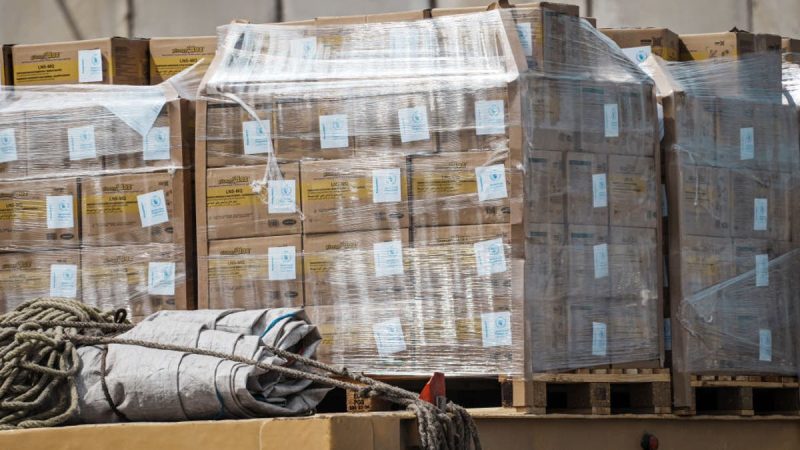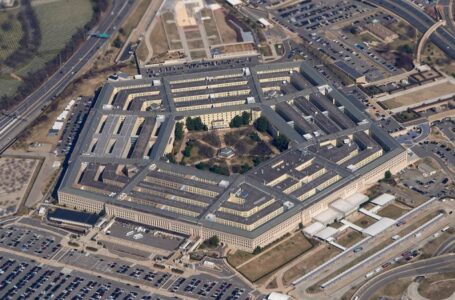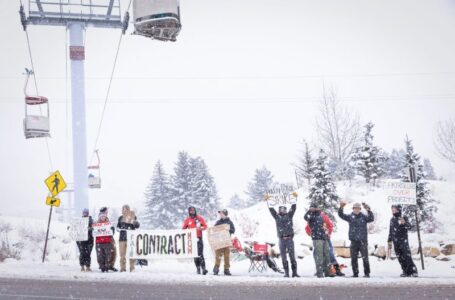Trump Sr. called for US ownership of Greenland. Now Trump Jr.’s expected to visit
Israel says UN ‘deceiving’ world over aid delays to Gaza


On a visit to Egypt last weekend, U.N. Secretary-General Antonio Guterres made a stop at the border crossing between the most populous Arab state and the war-stricken Gaza Strip. At the Rafah crossing, Guterres described seeing a ‘long line of blocked relief trucks waiting to be let into Gaza.’
Immediately after that, the Israelis accused the U.N.’s top official of ‘deceiving’ and noted, instead, that it was the U.N. that was holding up the deliveries of life-saving aid to people who are said to be on the verge of famine inside the Palestinian enclave.
‘Since October 7th, U.N. actors and agencies have told lie after lie about Hamas atrocities and Israel’s efforts to exercise its lawful right of self-defense,’ Anne Bayefsky director of the Touro Institute on Human Rights and the Holocaust and president of Human Rights Voices, told Fox News Digital.
Over the past few weeks, as images of malnourished Gaza children appear on news and social media channels, U.N. aid agencies and Israeli authorities have been locked in a bitter battle of narratives over who is to blame for preventing the deliveries of food, water and medicine from reaching more than 2 million civilians in various parts of the Strip.
Israeli officials say there are no limits on the amount of aid that can enter Gaza; the U.N. – and its aid agencies – maintain the opposite. They claim there are blockages caused by lengthy screening procedures and limited operating hours, particularly at the Rafah crossing, which is manned by Egypt, and have been pushing for Israel to open more entry points, especially in the north.
‘The slow pace of allowing the trucks through at Rafah creates one of the blockages, as does the blocking of UNRWA work in the north,’ Farhan Aziz Haq, a spokesman for Guterres told Fox News Digital on Monday. He was referring to the controversial United Nations Relief and Works Agency, which services Palestinian refugees and their families in the region but which has been accused of collaborating with Hamas, a U.S.-designated terror group.
‘Some trucks go through but not nearly enough, at a time when we will need to bring in about 300 trucks a day to avert famine,’ he said.
But Shimon Freedman, the international media spokesperson for COGAT, the Israeli military unit that coordinates between Israel and the Palestinian territories, reiterated to Fox News Digital that ‘Israel does not place any limit on the amount of aid that can enter the Gaza Strip.’
He said that in recent months, Israel has opened additional crossings into Gaza – including a special route to reach those trapped in the north. It has also bolstered its staff and expanded its inspection hours.
‘We have gone to great lengths to improve our inspection capabilities so that more aid can reach the people who need it,’ he said, emphasizing that ‘right now, we can inspect 44 trucks an hour.’
‘The problem lies with the international organization’s distribution capabilities,’ Freedman added.
Following a post on X by the secretary-general about trucks waiting at Rafah, COGAT posted a photo of aid waiting to be collected on the Gaza side of the Kerem Shalom border crossing with Israel.
Ahed Al-Hindi, a senior fellow at the Center for Peace Communications, who has been monitoring the humanitarian situation in Gaza, said many of the Gazan activists he had spoken to recently ‘expressed concerns about how humanitarian aid from abroad is being manipulated by Hamas.’
‘They told me that Hamas distributes aid selectively to its loyalists, using it as political leverage, particularly in areas experiencing food shortages,’ he said. ‘This tactic enables Hamas to recruit supporters among families affected by the conflict – a pattern that has taken place in other war-torn regions like Syria and Libya, where radical Islamist groups exploited international aid for political gain and recruitment purposes.’
‘Israelis, unlike many Western countries, are intimately familiar with these tactics, having dealt with militant organized groups for decades,’ said Al-Hindi. ‘They understand how U.N. aid can be exploited for recruitment purposes, both during times of war and peace.
‘Both narratives are correct,’ Shaul Bartal, a senior researcher at the Begin-Sadat Center for Strategic Studies at Bar Ilan University near Tel Aviv, told Fox News Digital.
‘There is enough aid, but there is a difficultly in distributing it correctly because Hamas controls a significant part of this area,’ he said, adding, ‘UNRWA is not working properly because of what is happening on the ground and also because some of its workers are members of Hamas, so they are helping them.’
Bartal, who has also been following events in Gaza closely, also noted that across the Strip, local gangs were looting the aid to sell on the black market and aid workers, including the truck drivers, were too afraid to enter certain lawless areas. Some of the drivers, he said, had even been killed while distributing the aid. Last month, more than 100 Gazans were killed when desperate civilians stormed an aid convoy.
Bartal said that in order for the aid to be distributed correctly, a local power needed to be directly involved.
‘There are only two local powers that are capable of effectively distributing the aid – Hamas or Israel,’ he said. ‘If Israel wanted to give the population humanitarian aid, then it could do so through the army.’
In a press briefing earlier this week, the IDF spokesman, Rear Adm. Daniel Hagari, said the army’s involvement in distributing humanitarian aid had been increasing in recent weeks, even as its troops continue to battle Hamas terrorists inside the territory.
‘We acknowledge the suffering of the people of Gaza,’ Hagari told reporters, describing how Israel had stepped up its humanitarian efforts in recent weeks, working together with the U.S., Egypt, the United Arab Emirates, and other international organizations, most notably the World Food Program, another U.N. relief agency.
‘There is a problem inside Gaza with the distribution because Hamas operatives are either stealing the food for their own needs and in areas it does not control there is looting,’ he said.
‘The problem of the distribution is the responsibility of international organizations – the IDF is part of the solution,’ said Hagari. ‘We understand there is no easy solution and that is why we’re focusing on flooding the area with humanitarian aid… I encourage every international organization that has a solution for the distribution problem to work together with COGAT and with the IDF.’
Hagari said that over the last 10 days, more than 1,522 trucks had entered Gaza carrying food, water and medical equipment, as well as construction materials for housing and shelter – according to COGAT’s website a further 500 trucks entered on Tuesday and Wednesday. In addition, he said the IDF had opened several new roads, including in the northern part of the territory, and was currently engaged in thinking of new and creative ways to reach those in need.
Bayefsky, whose organization, the Touro Institute on Human Rights and the Holocaust, is an accredited non-governmental organization with the UN, concluded, ‘Wild, totally unverifiable claims of numbers of dead civilians. Tall tales about aid deliveries, minus the truth about Hamas thefts and Jewish hostages starving. The list goes on and on. U.N. sources are quite simply utterly untrustworthy because U.N. actors from the secretary-general on down take their numbers, their ‘facts’ and their talking points from Hamas and the Palestinian Authority in Ramallah.’
During a press briefing on Monday, State Department spokesman Matt Miller said no assessment had been made on whether Israel was violating international humanitarian law when it comes to the provision of humanitarian assistance into Gaza.
‘That said, we do believe there is very much more that they [Israel] can do to let humanitarian assistance go in, both through Kerem Shalom and Rafah and also through the new 96 gate that opened up week before last, to allow convoys to move directly into the north without having to transit the somewhat perilous route inside Gaza,’ he said, adding there was also more Israel could do with respect to UNRWA and other U.N. agencies working to provide aid in Gaza.











